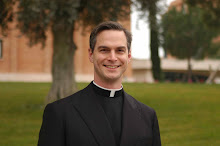
Q: Father John, how can I overcome distractions in prayer?
A: Having discussed the difference between voluntary and involuntary distractions, as well as the reason why God permits involuntary distractions, we are now ready to roll up our sleeves and get practical.
We will never be able to eliminate completely involuntary distractions (the ones that come into our heads uninvited and try to drag our attention away from the subject of our prayer) but we can do some things to help minimize them.
First, we can strive for regularity in our prayer commitments. As human beings our minds and bodies are intricately interwoven. Just as disciplining ourselves to follow a more or less regular schedule for sleeping, eating, and exercising gets our biorhythms humming steadily and healthily, so a little discipline in our prayer life helps our minds focus on the quest of meditation. Remember, though, that external circumstances are only a means to an end; they are meant to help us seek God more energetically and sincerely in prayer. They themselves are not the goal, so we have to keep flexible. Otherwise, we fall into Pharisaical legalism, thinking that “man was made for the Sabbath,” not “the Sabbath for man.” That said, here are some external factors that we can usually control, and that will help create a propitious environment for prayer, one that nips a lot of involuntary distractions in the bud:
- Stick to the same time of day for your mental prayer. If your daily meditation is 20 minutes long, don’t try to squeeze those 20 minutes into just any slot that opens up. Rather, schedule your other activities around your prayer time. If your prayer time is fixed and dependable, your prayer will become, over the long haul, more fruitful. Choose a time of day when you will likely have few interruptions, and when your energy level will be high. This is usually in the morning, before the hustle and bustle of daily duties and surprises start to clutter your mental radar screen, or during the first lull in those duties. Don’t make false excuses; it is possible to do this.
- Stick to the same place. This too should be a place where you are likely not to be disturbed, a place that encourages you to focus on God and speak with him in the quiet of your heart. One businessman I know was leading such a hectic life at one point that he started to park his car in the cemetery for fifteen minutes on the way to work, and do his daily meditation there.
- Prepare your material beforehand. It does not handcuff the Holy Spirit when we make a plan for our meditations, choosing ahead of time what book or resource we will use to help our conversation with God, and even what themes we will meditate on (this is a good topic for discussion with your spiritual director). On the contrary, if we have our notebook, Bible or meditation book, pen, personal prayer book, and whatever else we like to use during our meditation – if we have all those things ready ahead of time, it is much easier for us to focus on the important things when we actually begin our prayer. It is also advisable to call to mind the theme of tomorrow morning’s meditation the night before, as we are preparing for bed. This can get the mind working subconsciously even while we sleep.
- Choose an appropriate posture during your meditation. If sitting in an easy chair tends to make you sleepy, don’t do your meditation sitting in an easy chair. Your posture should express both your desire to hear God’s Word, and your awareness that God is God. Often it is helpful, for example, to kneel during the first moments of your meditation, as you first address God and renew your awareness of his presence. During the more reflective time, it can be helpful to sit. Then, as you finish your meditation by conversing heart to heart about what God has shown you, you may want to kneel again.
To repeat, we always need to stay flexible – sickness, vacation, travel, and other personal and family factors will force us to make adjustments, and on special days (e.g. the anniversary of our baptism) we may want to change the time and place of our prayer. But insofar as it is within our power, the more regular and disciplined we can be in this regard, the more sources of involuntary distractions we will be able to neutralize. Likewise, the personal integrity required to follow through on these simple tactics will strengthen the virtue we need to dismiss the involuntary distractions that do show up.
These concrete tactics can help us limit involuntary distractions, but only gradually; we need to form good habits in these areas in order to enjoy their good results. If you don’t have these habits formed, start now, one by one.
Yours in Christ, Father John Bartunek


Dan-I wish we could get some of Father's instruction recorded in his voice. I've heard him in a variety of audio reflections etc. and they are excellent-and people could listen to them as they commute. I know his voice so I can sometimes hear it in my imagination, when I read something like this reflection, especially. It really adds to it even though the written reflection lacks nothing as posted.
ReplyDeleteJo - I agree. Father John and I talked about this just last Saturday. We are working behind the scenes to see how we can make this kind of idea come to life. You might also want to check out the archives of the "Inner Life" on Relevant Radio. Great stuff. We need prayer, wisdom, and funding. The desire and capability is there. God bless.
ReplyDelete